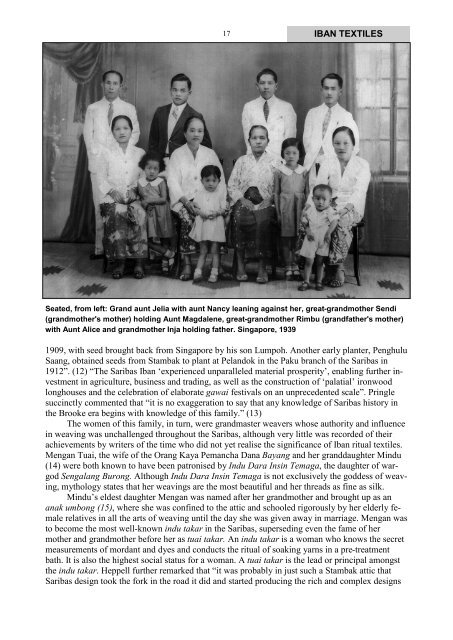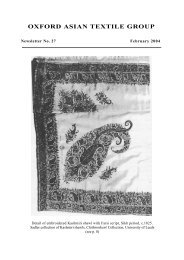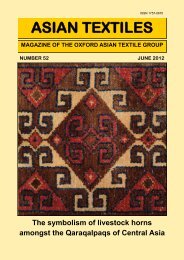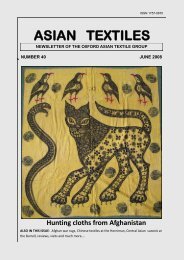IBAN TEXTILES16The island of Borneo is carved into three parts; the northern part makes up Malaysia withBrunei tucked neatly in the middle of the two Malaysian states of Sabah and Sarawak. The rest ofthe island belongs to Indonesia. In Sarawak, the Iban are found throughout much of the state. Inthe southern region is a river basin called the Saribas which has a weaving tradition that sets itapart from other regions. Economic prosperity and early interaction with foreign traders meant thatSaribas women could easily purchase fine commercial threads instead of working on home-growncotton which produced coarse threads and consequently bold designs.On these finely spun threads, Saribas weavers discovered that they could achieve finer designswhen using the equally fine fibre of the lemba (curculigo villosa) in the ikat process. Withinthe Saribas, the leading family founded by its paramount chief Orang Kaya Pemancha Dana Bayangestablished themselves by a small creek named Stambak near the mouth of the Saribas River.The women of this family quickly excelled in this new method and developed it to a degree neverbefore seen which soon became de rigueur throughout the region, and as Dr. Michael Heppellcommunicated to me, ―One thing I do remember being told in the Paku (2) was that a major designchange occurred in the Saribas and the source of that was Stambak.‖ (3)This family traces its ancestry to the Orang Kaya Pemancha Dana Bayang, the ―mostdreaded Saribas ‗pirate‘, the man who commanded the marauding fleets‖ (4) who had threatenedto put Rajah James Brooke‘s head in a basket. (5) Brooke later wrote, ―The Orang Kaya Pomancha,of Sarebas, is now with me - the dreaded and the brave, as he is termed by the natives. He issmall, plain-looking and old, with his left arm disabled, and his body scarred with spear wounds. Ido not dislike the look of him, and of all the chiefs of that river I believe he is the most honest, andsteers his course straight enough‖. (6)The Orang Kaya Pemancha Dana Bayang was succeeded by his son the Orang Kaya Aji PatiMalayu Duat Pengiran Bunsu who was colourfully described as one of the most cruel andtreacherous head-hunters of those days. (7)His daughter, Mindu, married PanglimaBudin Gerasi, the great-grandson of UnggangLebor Menoa, a rival chief from theUpper Layar. (8) This arranged marriagepacified the ―smouldering dispute betweentwo Iban families, like the feud betweenthe Montagues and the Capulets, an importantfactor in local politics for years‖. (9)Panglima Budin Gerasi, the head ofthis extended kindred, pioneered the cultivationof coffee and rubber in the Saribas.―Among the first planters [of coffee] wereleading Iban families in the middle Saribaswho established their gardens early in 1889and obtained their first output in 1892. In1895 the Resident reported: The Stambok[i.e. Stambak] gardens are being enlarged.Gergasi [the Malay version of Budin'spraise-name], the head of the house thereowns quite eight hundred trees and employslabour (Dyak). His paddy farm thisyear was made for him by Malays onwages‘‖. (10)―In the riverine zone at Stambak, belowBetong, the headman Budin (the coffeeplanter of the 1890s mentioned above)Great grandmother Sendi and I. Kuching, Xmas 1968 planted over 4,000 seedlings [of rubber] in
17 IBAN TEXTILESSeated, from left: Grand aunt Jelia with aunt Nancy leaning against her, great-grandmother Sendi(grandmother's mother) holding Aunt Magdalene, great-grandmother Rimbu (grandfather's mother)with Aunt Alice and grandmother Inja holding father. Singapore, 19391909, with seed brought back from Singapore by his son Lumpoh. Another early planter, PenghuluSaang, obtained seeds from Stambak to plant at Pelandok in the Paku branch of the Saribas in1912‖. (12) ―The Saribas Iban ‗experienced unparalleled material prosperity‘, enabling further investmentin agriculture, business and trading, as well as the construction of ‗palatial‘ ironwoodlonghouses and the celebration of elaborate gawai festivals on an unprecedented scale‖. Pringlesuccinctly commented that ―it is no exaggeration to say that any knowledge of Saribas history inthe Brooke era begins with knowledge of this family.‖ (13)The women of this family, in turn, were grandmaster weavers whose authority and influencein weaving was unchallenged throughout the Saribas, although very little was recorded of theirachievements by writers of the time who did not yet realise the significance of Iban ritual textiles.Mengan Tuai, the wife of the Orang Kaya Pemancha Dana Bayang and her granddaughter Mindu(14) were both known to have been patronised by Indu Dara Insin Temaga, the daughter of wargodSengalang Burong. Although Indu Dara Insin Temaga is not exclusively the goddess of weaving,mythology states that her weavings are the most beautiful and her threads as fine as silk.Mindu‘s eldest daughter Mengan was named after her grandmother and brought up as ananak umbong (15), where she was confined to the attic and schooled rigorously by her elderly femalerelatives in all the arts of weaving until the day she was given away in marriage. Mengan wasto become the most well-known indu takar in the Saribas, superseding even the fame of hermother and grandmother before her as tuai takar. An indu takar is a woman who knows the secretmeasurements of mordant and dyes and conducts the ritual of soaking yarns in a pre-treatmentbath. It is also the highest social status for a woman. A tuai takar is the lead or principal amongstthe indu takar. Heppell further remarked that ―it was probably in just such a Stambak attic thatSaribas design took the fork in the road it did and started producing the rich and complex designs
















